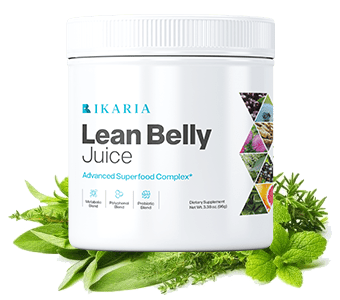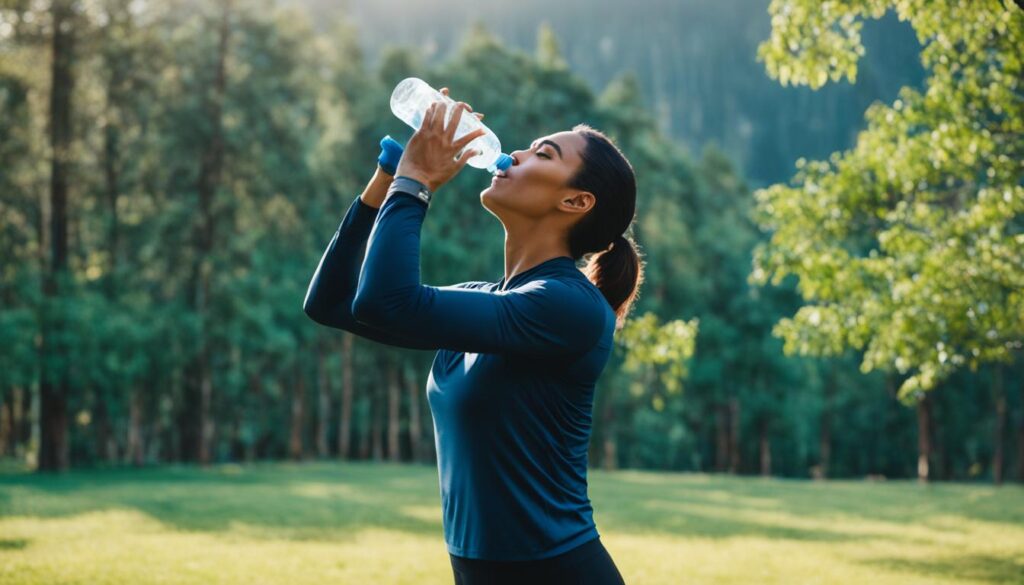
The human body’s reliance on water stretches far beyond simple thirst. Optimal hydration is the linchpin of vitality, fueling our every cellular dance. Developing healthy water consumption habits isn’t just a lifestyle choice; it’s a pillar of longevity. The difference between drinking water and sipping on live water loaded with minerals can have tangible impacts. In the quest for pure water, understanding water quality is as crucial as the quantity consumed. This is not merely about averting dehydration but embracing the full spectrum of health benefits hydration imparts.
Balance is pivotal – too little, and our body flounders; too much, and the systems may falter. Let’s dive into the essentials of hydration, explore the sources of our most precious liquid, and unlock the secrets to harnessing its life-sustaining potential.
Key Takeaways
- Hydration’s role in maintaining bodily functions cannot be overstated – it’s a health imperative.
- Individual water needs fluctuate based on lifestyle, environment, and biological factors.
- Quality of water has as much significance as quantity to reap full health benefits.
- Good hydration practices can elevate energy levels and metabolic efficiency.
- Understanding and monitoring personal hydration levels ensures optimal health and performance.
- Embracing hydration knowledge can prevent the risks associated with both dehydration and overhydration.
The Importance of Water in Our Bodies
The human body is a masterpiece of biological engineering, and water is one of its most essential components. A staggering up to 60% of an adult’s body weight is accounted for by water, highlighting its critical role in our physiology. Each water molecule is a tiny architect building the foundation of our health. Understanding the properties of water and its significance can equip us with the knowledge to better care for ourselves.
In the realm of water science, the chemical and physical properties of water are diverse and influential. For instance, water’s ability to regulate body temperature through sweat is a testament to its adaptability and function. As we delve into the water composition within our cells and organs, it becomes clear why staying hydrated is paramount.
Here are just a few roles that water plays in our body:
- It serves as a medium for metabolizing food, allowing for the seamless conversion of nutrients into energy.
- Through its solvent properties, water facilitates the transportation of nutrients to where they are most needed.
- Water plays a pivotal role in regulating temperature, maintaining a stable internal environment regardless of external conditions.
- And crucially, it assists in removing toxins from the body, clearing the path for optimal health.
Considering the daily water loss we experience via sweat, respiration, and waste, replenishing our body’s water supply becomes a non-negotiable aspect of our health routine. Embrace the science of hydration to protect and enhance your well-being.
How Much Water Do You Really Need?
Ensuring a proper daily fluid intake is critical for maintaining good health and preventing dehydration. Yet, the precise amount varies per individual, guided by unique physiological requirements and lifestyle choices. To fully comprehend the importance of water intake and to make safe drinking water a priority, let’s delve deeper into the specific needs and potential risks associated with water consumption.
Individual Hydration Needs
Factors such as biological sex, body weight, and physical activity levels influence one’s hydration needs. To safeguard kidney function and promote overall wellness, identifying personal fluid needs is essential. Sports, warm climates, and health conditions are all variables that necessitate adjustments in water consumption to sustain electrolytes balance.
Understanding Daily Fluid Intake Recommendations
The U.S. National Academies of Science, Engineering, and Medicine outlines general water intake recommendations: about 3.7 liters for men and 2.7 liters for women per day. These totals account for all fluid sources, including beverages like tea and foods with high water content, such as fruits and vegetables.
Risks of Overhydration
While less common than dehydration, overhydration can be equally harmful, leading to water intoxication or hyponatremia. This occurs when high water intake dilutes the sodium in the body, disrupting electrolytes balance and potentially overwhelming kidney function. Awareness of both overhydration and dehydration signs is crucial for maintaining a healthy water balance.
Consulting a healthcare provider for personalized advice can help navigate the complexities of hydration, ensuring that water intake recommendations are adapted to one’s health status and lifestyle, thereby securing a route to optimal hydration.
| Daily Fluid Source | Average Intake for Men | Average Intake for Women |
|---|---|---|
| Water | 3.0 liters | 2.2 liters |
| Other Beverages | 0.5 liters | 0.5 liters |
| Food | 0.2 liters | 0.2 liters |
| Total | 3.7 liters | 2.7 liters |
Remembering that these recommendations are starting points can assist in fine-tuning daily fluid intake to suit individual needs. It’s important to listen to one’s body, note thirst cues, and consume safe drinking water regularly throughout the day.
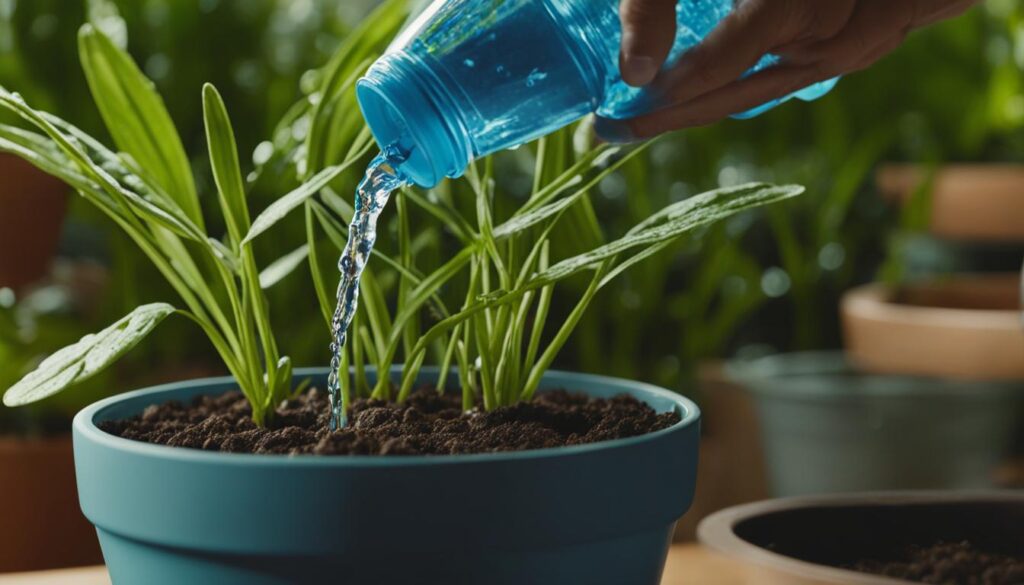
Smart Hydration Habits for Better Health
Understanding the nexus between effective hydration habits and health benefits can have profound impacts on physical well-being. Not only is the body’s need for clean water biologically intrinsic, but the quality of the water consumed also plays a critical role. Utilizing purified water and water filtration systems ensures the removal of potential contaminants, fostering better water quality for hydration.
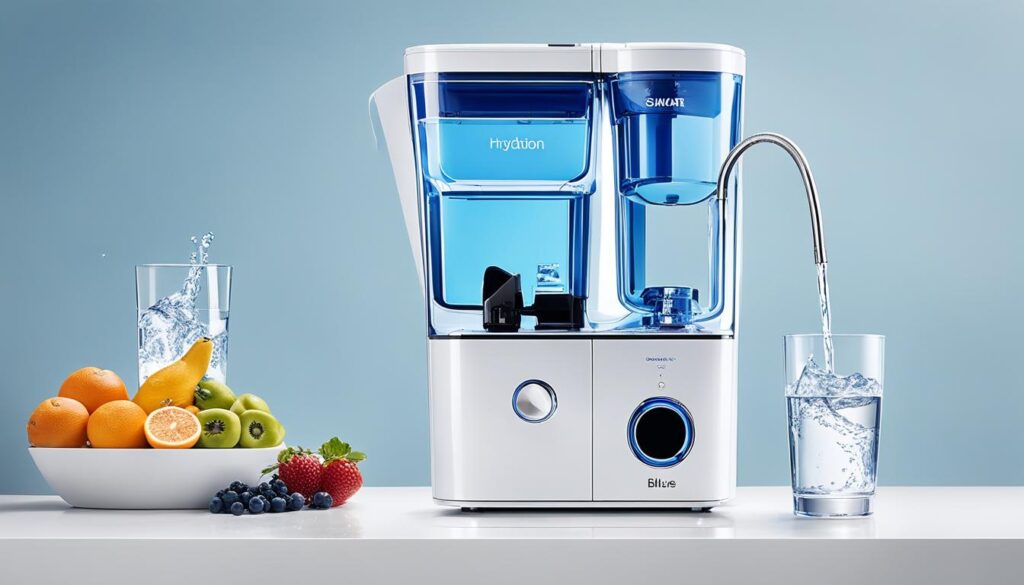
Create an image of purified water being filtered through a sleek and modern filtration system. Show the clear and refreshing water flowing smoothly through the system, with no impurities in sight. Use cool blues and clean whites to evoke a sense of freshness and purity, and highlight the importance of smart hydration habits for better health. Consider including subtle imagery of fruits or vegetables to suggest the benefits of drinking clean, purified water for overall wellbeing.
Establishing habitual consumption of safe water and sanitation practices can be facilitated through simple yet meaningful everyday actions. Here are some hydration habits that can be easily integrated into daily routines to harness the full spectrum of health benefits:
- Begin the day by drinking a glass of water to jump-start digestion and metabolism.
- Prefer water or mineral water over sugary beverages for an effective calorie reduction strategy.
- Utilize hydration apps or alarms as reminders to drink water consistently throughout the day.
- Keep a reusable water bottle at hand as a visual cue and convenient hydration solution.
- Take advantage of the natural flavor of fruits by adding them to water for an enjoyable twist.
“Inculcating proper hydration habits is not just about drinking ample water; it’s also about ensuring that every sip is contributing to your health in the purest form.”
Below is a comparison of various ways to maintain high-quality hydration and their associated benefits:
| Hydration Habit | Benefit |
|---|---|
| Drinking filtered water | Reduces risk of consuming harmful bacteria and contaminants |
| Using a reusable bottle | Promotes sustainability and consistent water intake |
| Swapping sugary drinks for water | Contributes to better weight management and dental health |
| Adding natural flavors to water | Enhances taste without adding calories, encouraging more fluid intake |
| Setting reminders to drink water | Builds a pattern of regular hydration, thus improving cognitive function and mood |
Water: Earth’s Most Vital Resource
The significance of water extends beyond its life-sustaining properties for humans, as it plays an integral role in the health and stability of the planet’s ecosystems. Earth’s surface is majestically draped in a blue mantle of water that is fundamental to the hydrosphere–a dynamic system where water continuously flows between the atmosphere, land, and ocean. This flow, known as the hydrologic cycle, is crucial for regulating climate, transferring nutrients, and supporting a rich biodiversity on the planet.

The Role of Water in the Environment
Water resources such as groundwater and surface water are the veins and arteries of the Earth, quenching the thirst of natural habitats and sustaining life. Groundwater, a significant part of the water supply, nestles invisibly beneath our feet and replenishes surface waters, which include rivers, lakes, and oceans. The intricate balance of water chemistry is what allows ecosystems to flourish, providing habitat and nourishment to countless species.
Ensuring Sustainable Water Resources
As stewards of the Earth, it is our paramount duty to ensure the longevity of our water systems through sustainable practices. Overuse, pollution, and climate change threaten the delicate equilibrium of our water supply. Sustainable water resources are more than an environmental goal; they represent a lifeline for future generations. It is, therefore, essential to respect the hydrologic cycle and employ technology to maintain the purity and abundance of our hydrosphere.
| Water Source | Key Characteristics | Importance to Ecosystem |
|---|---|---|
| Groundwater | Stored in aquifers; typically cleaner than surface water | Supports wetlands; sustains rivers during dry periods |
| Surface Water | Includes lakes, rivers, and streams; more accessible | Provides habitat; critical for transportation and recreation |
| Oceans | Vast and deep; saline water | Regulates climate; supports diverse marine life |
| Ice Caps/Glaciers | Frozen fresh water; large freshwater reservoir | Reflects solar radiation; global water reserve |
Nutritional Value and Health Benefits of Water
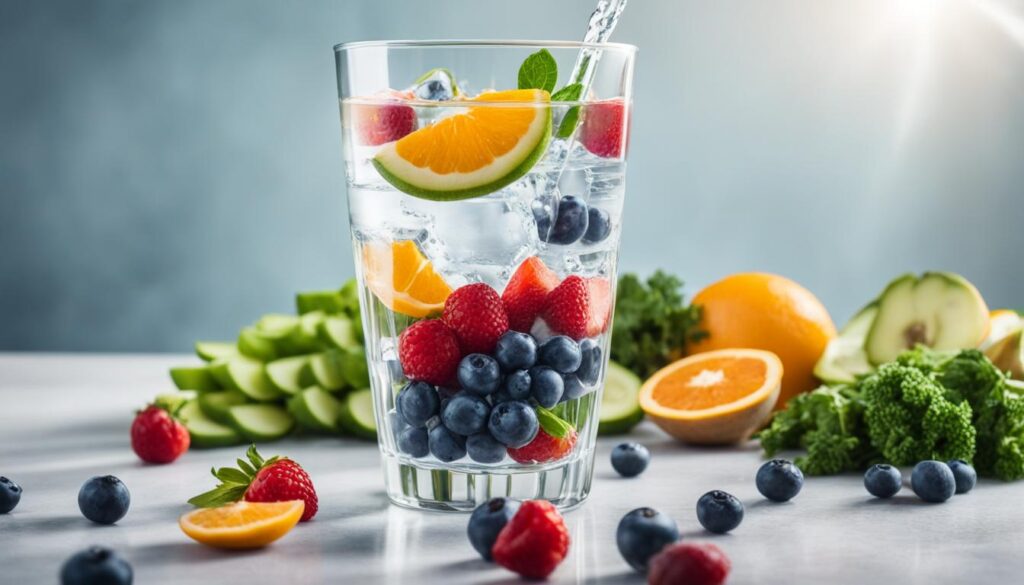
Though devoid of calories or macronutrients, water’s contribution to nutrition hinges on its paramount role as a facilitator of biological processes vital to maintaining life. Its clear, life-sustaining properties make it indispensable, both as a medium for cellular activities and as a component essential for overall hydration benefits. The importance of mineral water derives from its additional mineral content, which can contribute to dietary needs for electrolytes such as calcium and magnesium. Below, we discuss the profound benefits of water that underscore its status as more than just a thirst quencher.
- Transports Nutrients: Acting as the body’s transportation system, water aids in distributing vital nutrients to cells, ensuring that each part of the body gets the fuel it needs for energy production and cellular functions.
- Enhances Physical Performance: Adequate water for health is particularly important during prolonged physical activity or high heat exposure. Hydration is key for maintaining endurance, strength, and performance levels.
- Supports Weight Management: Water can aid in weight loss efforts for adults with obesity, as it boosts metabolism and may help in appetite regulation when consumed before meals.
- Facilitates Digestive Processes: An essential player in digestion, water helps break down food, allowing the body to absorb nutrients effectively while also preventing constipation.
- Maintains Aquatic Life: Beyond human health, water is the vital component of habitats that support diverse forms of aquatic life. It is integral to ecosystem balance and biodiversity.
- Regulates Body Temperature: Water’s high heat capacity allows it to regulate core body temperature through the processes of sweating and respiration, protecting the body from overheating.
The enumeration of the benefits of water can’t be overstated; it resides at the heart of countless biological processes, without which the rhythm of life, from the cellular level to entire ecosystems, would simply cease to exist. The World Health Organization underscores the integral role water plays in dissolving minerals and nutrients, making them accessible to the body, and facilitating crucial bodily functions such as waste elimination.
“Water is the driving force of all nature.” – Leonardo da Vinci
This universal solvent, though humble in its transparent appearance, is indeed the fluid of life—an indispensable element in the tapestry of health and the environment.
Water Filtration and Purification Techniques
Ensuring the purity and safety of the water we consume is of paramount importance. With the modern world facing a plethora of contaminants, the significance of water filtration and water purification techniques has grown exponentially. These methods not only aim to provide clean water but also underscore our collective responsibility towards the environment and adherence to standards set by authorities like the US EPA.
Home Water Filtration Systems
Technological advancements have made sophisticated water treatment solutions accessible for households. Homeowners now have the capability to select from a variety of filtration systems, ranging from simple pitcher filters to advanced reverse osmosis units. These systems can effectively remove impurities such as sediment, chlorine, and even pathogens from tap water, making it safer and often improving its taste. As consumers grow increasingly concerned about water quality, the adoption of home water filtration systems is on a steady rise, reflecting a proactive approach to health and well-being.
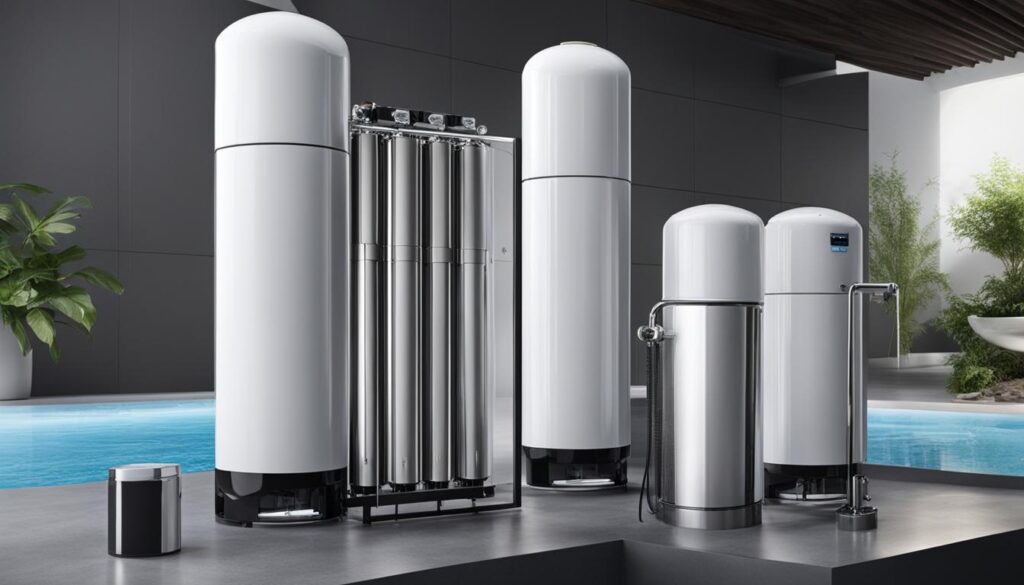
Environmental Impact of Bottled Water
The convenience of bottled water is undeniable, but its environmental footprint cannot be ignored. Plastic bottles contribute to mounting waste and pollution, presenting a considerable ecological challenge. The production and transportation of bottled water are resource-intensive processes that also generate significant carbon emissions. Thus, while reaching for that bottle of water might seem trivial, the cumulative impact on our planet is far from negligible. Investing in a home water filtration system is not only beneficial for ensuring access to clean water, but it’s also a step towards reducing reliance on bottled options and fostering a more sustainable future.
In conclusion, as we delve deeper into the complexities of maintaining water purity, the relevance of adopting efficient water filtration and purification systems grows more evident. Whether it’s the need for clean water sourced from water wells or the desire to reduce the environmental impact of bottled water, the choices we make today resonate with our commitment to both health and the environment.
Innovative Ways to Increase Your Water Intake
As we strive to enhance our daily hydration habits, embracing innovations in hydration technology can significantly increase water intake. With a range of smart devices and natural infusions at our disposal, sipping on H2O has never been more exciting or beneficial.
Using Technology to Monitor Hydration
The dawn of hydration technology has brought with it an array of water tracking apps and smart water bottles engineered to keep us well-hydrated throughout the day. From bottles that sync with our smartphones to provide real-time hydration stats, to apps equipped with hydration calculators that customize daily water intake goals, technology is revolutionizing the way we drink water.
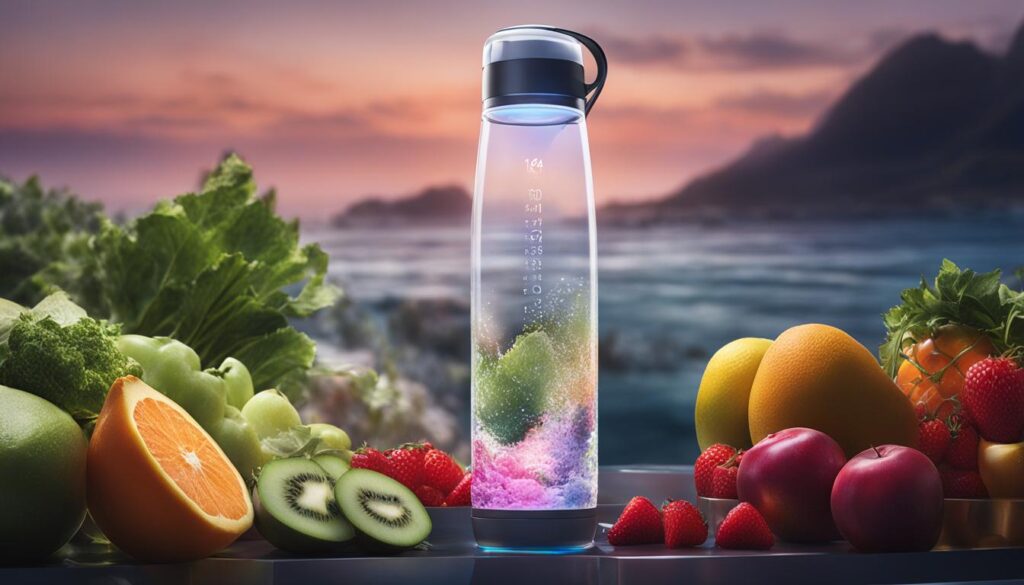
Here’s an overview of how tech is making it simpler and more engaging to stay hydrated:
| Product | Type | Description | User Benefits |
|---|---|---|---|
| Smart Water Bottles | Hydration Gadget | Bottles with sensors that track water intake and glow to remind you to drink. | Automatic tracking; timely reminders. |
| Hydration Apps | Mobile Application | Apps that log water consumption and offer personalized hydration levels. | Convenience; customization. |
| Hydration Calculators | Online Tool | Web-based calculators that suggest daily water intake based on individual factors. | Personalized hydration goals; easy to use. |
Infusing Water with Natural Flavors
Apart from technology, the trend of infusing water with natural water flavors is picking up steam. Whether it’s slices of cucumber, fragrant herbs, or juicy berries, fruit-infused water is a delightful way to up your water intake while reaping the benefits of added vitamins and antioxidants.
- Infusing enriches water taste without artificial additives.
- Fruit infusions make hydration more appealing and refreshing.
- It’s an easy way to enjoy a variety of natural water flavors in your daily routine.
Encouraging ample water consumption need not be a mundane task. Through the seamless integration of tech and nature, we can ensure that the water we drink not only sustains us but also sparks a bit of joy in our healthy lifestyle habits.
Conclusion
The journey towards maintaining adequate hydration and health is one paved with knowledge about our bodies’ needs and the implementation of consistent, intelligent choices towards water intake. With water being the lynchpin of biological functions and ecological balance, it becomes clear that to stay hydrated is to embrace a practice that encapsulates both personal wellness and global sustainability. A mindful approach to water consumption not only secures the myriad benefits of proper hydration—ranging from optimal physical performance to cognitive clarity—but also ensures a positive impact on the environment.
Our understanding of how much water our bodies require underpins the formation of habits that support a healthful daily routine. Acknowledging the intrinsic role that clean, pure water plays both within us and in the world around us, the focus intensifies on practices such as filtration and mindful use that safeguard its quality and accessibility. Techniques and behaviors developed and honed for personal health can and do translate into greater ecological consciousness.
As this article has elucidated, innovative tools have surfaced to assist in our quest to monitor and enhance our hydration habits. It’s through the adoption of these advancements, alongside a renewed respect for water’s significance, that one can align with a lifestyle that emboldens a healthier self and a more conscious, well-hydrated society. The pursuit of hydration excellence is not a mere act; it is a daily commitment to our bodies and to the planet that sustains us.
FAQ
How does water consumption impact overall health?
Adequate water consumption is essential for maintaining bodily functions such as regulating body temperature, lubricating joints, and flushing waste. It keeps hydration levels balanced, which is crucial for metabolism, energy levels, and preventing dehydration.
What is the average percentage of water in the human body?
Water makes up to about 60% of an adult’s body weight and is involved in various essential biological processes including digestion, temperature regulation, and detoxification.
How much water should an individual drink each day?
Daily water intake needs vary based on factors like sex, weight, and activity level. The U.S. National Academies of Science, Engineering, and Medicine suggest about 3.7 liters for men and 2.7 liters for women, which includes all fluid sources.
What are potential health risks associated with overhydration?
Overhydration can lead to water intoxication, which disrupts electrolyte balance and can strain the kidneys. Symptoms may include nausea, headaches, confusion, and in extreme cases, seizures or coma.
What are some smart hydration habits?
Hydration habits that can lead to better health include drinking water regularly throughout the day, starting with upon waking and before meals, choosing water over sugary drinks, and monitoring consumption to ensure adequate intake.
Why is water considered Earth’s most vital resource?
Water is essential for life, supporting aquatic ecosystems, being part of the hydrological cycle, and helping to regulate the Earth’s climate. Clean water resources are vital for human use and maintaining environmental balance.
What are the health benefits of drinking water?
Drinking sufficient water can improve skin health, aid in digestion, promote nutrient absorption, and assist in weight management. It can also improve alertness, mood, physical performance, and support immune function.
How can we ensure the water we drink is safe?
Water purification and filtration techniques remove contaminants, making water safe for consumption. Home water filtration systems vary in complexity, and tap water is regulated by the US EPA. However, additional home filtration can further improve water quality.
What is the environmental impact of bottled water?
Bottled water contributes to environmental issues such as plastic waste and resource depletion. Opting for reusable bottles and home filtration systems can help minimize this impact.
How can technology help with water consumption?
Technology such as water tracking apps and smart water bottles can help monitor and remind individuals to hydrate, while water infusers can enhance the appeal of drinking water by adding natural flavors without extra calories.


